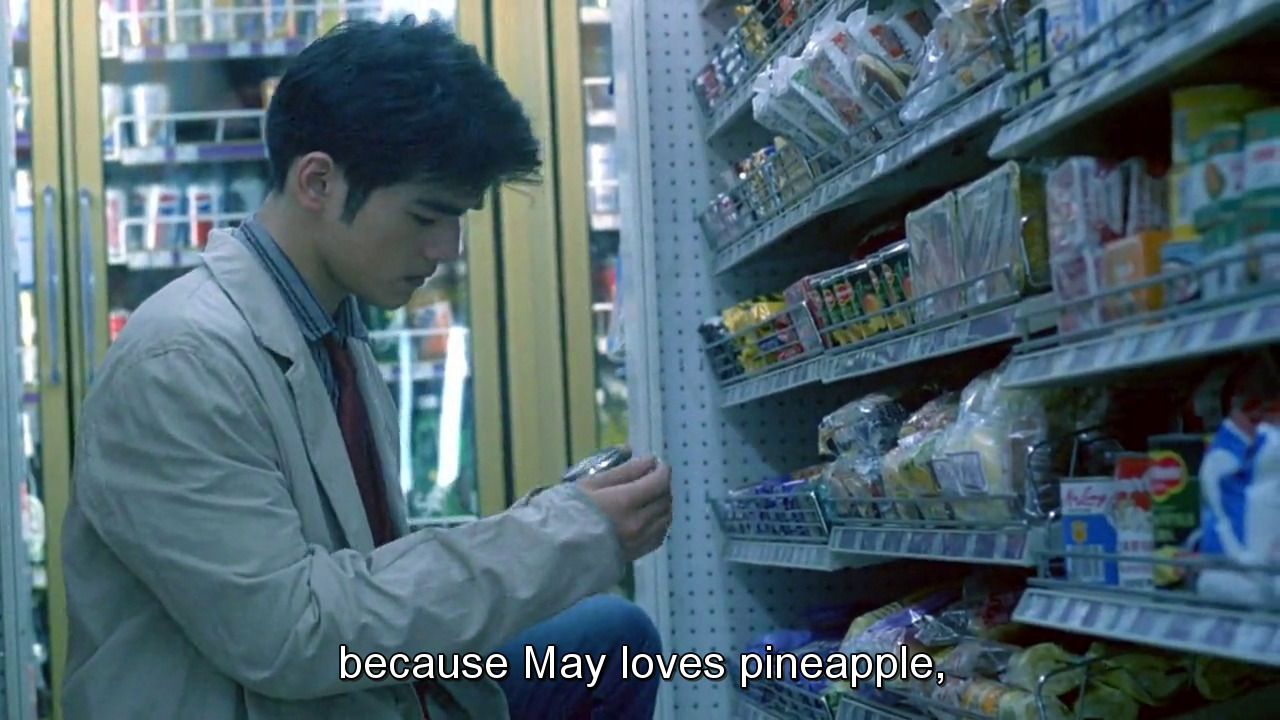This feels like a minor film compared to In The Mood For Love or Ashes of Time. It's set in the present day, and while Wong Kar-Wai is still obsessed by the lovelorn stoicism of his characters, at least here he gives one budding couple an escape.
It's still a bit of a mess though, and I'm not just talking about the long exposure effect Kar-Wai likes to use for his chase scenes. The film is actually two separate films clumsily jammed together, with a takeaway outlet in Hong Kong's Chungking Mansions serving as the bridge between them. Both don't really have enough to them. They are like short stories – vignettes designed to introduce you to a shared setting. And the first is particularly ludicrous, involving a drug dealer gunning down a bunch of double-crossing Indian migrants.
All the characters in Chunking Express feel one-dimensional, defined by quirks like a fixation on tinned pineapples or the song 'California Dreamin' by The Mamas & the Papas. These serve as obvious symbols for loneliness or wanderlust, and they create recurring patterns which fail to build to anything beyond the sum of the parts.
The plot is as contrived as anything else by Wong Kar-Wai – every one of his films I've seen tries to stretch out the possibility of a connection between lovers past endurance. Depending on your tastes, this might be a good thing or a bad thing. I find it unappealingly manipulative when the achingly cool characters involved are so completely devoid of personality.
11.2.17
5.2.17
Trans-Europ-Express
One of the reasons I loved Alain Robbe-Grillet's Successive Slidings of Pleasure was that beneath the weird random imagery it had a sly sense of humor. That delight in the absurd shines through a lot clearer in Trans-Europ-Express – which is essentially a parody of Hitchcockian thrillers. There are several sketches and exchanges which are really quite funny – often almost childishly so.
The film could have done with a bit more of that, and a bit less of the protagonist wandering around the city or the train or pacing his room. But you can't blame Robbe-Grillet for wanting to film great images of Antwerp's Grand Central Station or the city's docks. Nor can you stop him from inserting three scenes exploring the protagonist's deviant sexuality. While noir usually keeps heroes chaste and reserves perversity for villains – here the hero is entrapped and destroyed by lust. Detective stories are usually rather formulaic affairs, but here the plot gets chewed up and mangled by the presence of desire.
While it's enjoyable to watch Robbe-Grillet improvise a film off the cuff and be constantly undercut by the script girl (played by his wife), the film within a film conceit feels less fresh than it perhaps would have done in the 1960s. The overt reminders that you are watching something made up doesn't feel that radical any more. Successive Slidings of Pleasure basically uses the same effect without calling attention to it, and that subtlety makes it a more surprising and provoking film.
The film could have done with a bit more of that, and a bit less of the protagonist wandering around the city or the train or pacing his room. But you can't blame Robbe-Grillet for wanting to film great images of Antwerp's Grand Central Station or the city's docks. Nor can you stop him from inserting three scenes exploring the protagonist's deviant sexuality. While noir usually keeps heroes chaste and reserves perversity for villains – here the hero is entrapped and destroyed by lust. Detective stories are usually rather formulaic affairs, but here the plot gets chewed up and mangled by the presence of desire.
While it's enjoyable to watch Robbe-Grillet improvise a film off the cuff and be constantly undercut by the script girl (played by his wife), the film within a film conceit feels less fresh than it perhaps would have done in the 1960s. The overt reminders that you are watching something made up doesn't feel that radical any more. Successive Slidings of Pleasure basically uses the same effect without calling attention to it, and that subtlety makes it a more surprising and provoking film.
2.2.17
The Gap Between Panels / Finding a role
Latest column on the London Graphic Novel Network spoils the shit out of Fumio Obata's Just So Happens – whose main character shares some uncanny similarities with my partner (even down to the name). The book is a critique of ossified Japanese social norms, but it also recognises that it's impossible to completely step outside of society and define yourself without reference to other people's expectations of what you should be. Title of the piece an oblique reference to Dean Acheson's famous quote about Britain, and this book I haven't read. Read it here.
Subscribe to:
Posts (Atom)

